实验5
task1.1
#include <stdio.h> #define N 4 int main() { int x[N] = {1, 9, 8, 4}; int i; int *p; // 方式1:通过数组名和下标遍历输出数组元素 for (i = 0; i < N; ++i) printf("%d", x[i]); printf("\n"); // 方式2:通过指针变量遍历输出数组元素 (写法1) for (p = x; p < x + N; ++p) printf("%d", *p); printf("\n"); // 方式2:通过指针变量遍历输出数组元素(写法2) p = x; for (i = 0; i < N; ++i) printf("%d", *(p + i)); printf("\n"); // 方式2:通过指针变量遍历输出数组元素(写法3) p = x; for (i = 0; i < N; ++i) printf("%d", p[i]); printf("\n"); return 0; }
实验截图
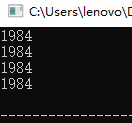
task1.2
#include <stdio.h> int main() { int x[2][4] = {{1, 9, 8, 4}, {2, 0, 4, 9}}; int i, j; int *p; // 指针变量,存放int类型数据的地址 int(*q)[4]; // 指针变量,指向包含4个int型元素的一维数组 // 使用数组名、下标访问二维数组元素 for (i = 0; i < 2; ++i) { for (j = 0; j < 4; ++j) printf("%d", x[i][j]); printf("\n"); } // 使用指针变量p间接访问二维数组元素 for (p = &x[0][0], i = 0; p < &x[0][0] + 8; ++p, ++i) { printf("%d", *p); if ((i + 1) % 4 == 0) printf("\n"); } // 使用指针变量q间接访问二维数组元素 for (q = x; q < x + 2; ++q) { for (j = 0; j < 4; ++j) printf("%d", *(*q + j)); printf("\n"); } return 0; }
实验截图
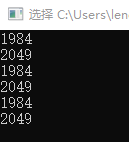
task2.1
int main() { char s1[] = "Learning makes me happy"; char s2[] = "Learning makes me sleepy"; char tmp[N]; printf("sizeof(s1) vs. strlen(s1): \n"); printf("sizeof(s1) = %d\n", sizeof(s1)); printf("strlen(s1) = %d\n", strlen(s1)); printf("\nbefore swap: \n"); printf("s1: %s\n", s1); printf("s2: %s\n", s2); printf("\nswapping...\n"); strcpy(tmp, s1); strcpy(s1, s2); strcpy(s2, tmp); printf("\nafter swap: \n"); printf("s1: %s\n", s1); printf("s2: %s\n", s2); return 0; }
实验截图
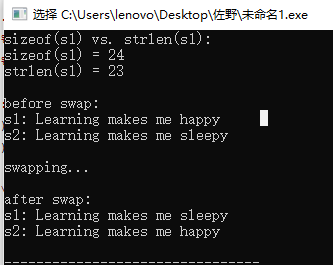
问题
1.24字节 s1所占的字节长度(包括\0) 有效字符串的长度
2.,不能 s1是地址常量,从表达式的角度来说不符合规则
3.交换了
task2.2
#include <stdio.h> #include <string.h> #define N 80 int main() { char *s1 = "Learning makes me happy"; char *s2 = "Learning makes me sleepy"; char *tmp; printf("sizeof(s1) vs. strlen(s1): \n"); printf("sizeof(s1) = %d\n", sizeof(s1)); printf("strlen(s1) = %d\n", strlen(s1)); printf("\nbefore swap: \n"); printf("s1: %s\n", s1); printf("s2: %s\n", s2); printf("\nswapping...\n"); tmp = s1; s1 = s2; s2 = tmp; printf("\nafter swap: \n"); printf("s1: %s\n", s1); printf("s2: %s\n", s2); return 0; }
截图
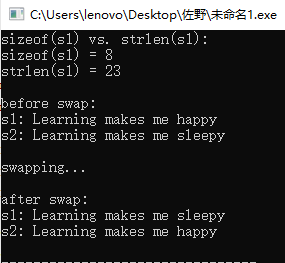
问题:1.存放的是这组字符串的地址 计算的是该地址所占的字节数 计算的是根据s1的地址寻找到的字符串的有效长度
2.可以,因为s1是一个指针变量,而task2.1中是一个地址常量从规则上说task2.2成立而1不成立
3.交换的是其中保存的地址 没有
task3
#include <stdio.h> void str_cpy(char *target, const char *source); void str_cat(char *str1, char *str2); int main() { char s1[80], s2[20] = "1984"; str_cpy(s1, s2); puts(s1); str_cat(s1, " Animal Farm"); puts(s1); return 0; } void str_cpy(char *target, const char *source) {while (*target++ = *source++); } void str_cat(char *str1, char *str2) {while (*str1) str1++; while (*str1++ = *str2++); }
截图

task4.
#include <stdio.h> #define N 80 int func(char *); int main() {char str[80]; while (gets(str) != NULL) {if (func(str)) printf("yes\n"); else printf("no\n"); } return 0; } int func(char *str) { char *begin, *end; begin = end = str; while (*end) end++; end--; while (begin < end) {if (*begin != *end) return 0; else{begin++; end--; } } return 1; }
实验截图

task5.
#include <stdio.h> #define N 80 void func(char *); int main() { char s[N]; while (scanf("%s", s) != EOF) { func(s); puts(s); } return 0; } void func(char *str) { int i; char *p1, *p2, *p; p1 = str; while (*p1 == '*') p1++; p2 = str; while (*p2) p2++; p2--; while (*p2 == '*') p2--; p = str; i = 0; while (p < p1) { str[i] = *p; p++; i++; } while (p <= p2) { if (*p != '*') { str[i] = *p; i++; } p++; } while (*p != '\0') { str[i] = *p; p++; i++; } str[i] = '\0'; }
实验截图

task6.1
#include <stdio.h> #include <string.h> void sort(char *name[], int n); int main() { char *course[4] = {"C Program", "C++ Object Oriented Program", "Operating System", "Data Structure and Algorithms"}; int i; sort(course, 4); for (i = 0; i < 4; i++) printf("%s\n", course[i]); return 0; } void sort(char *name[], int n) { int i, j; char *tmp; for (i = 0; i < n - 1; ++i) for (j = 0; j < n - 1 - i; ++j) if (strcmp(name[j], name[j + 1]) > 0) { tmp = name[j]; name[j] = name[j + 1]; name[j + 1] = tmp; } }
实验截图
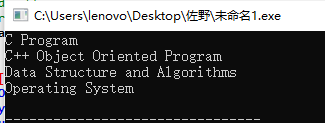
task6.2
#include <stdio.h> #include <string.h> void sort(char *name[], int n); int main() { char *course[4] = {"C Program", "C++ Object Oriented Program", "Operating System", "Data Structure and Algorithms"}; int i; sort(course, 4); for (i = 0; i < 4; i++) printf("%s\n", course[i]); return 0; } void sort(char *name[], int n) { int i, j, k; char *tmp; for (i = 0; i < n - 1; i++) { k = i; for (j = i + 1; j < n; j++) if (strcmp(name[j], name[k]) < 0) k = j; if (k != i) { tmp = name[i]; name[i] = name[k]; name[k] = tmp; } } }
实验截图
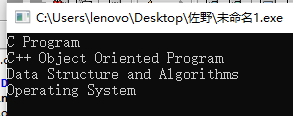
问题:交换的是指针变量的值
task7.
#include <stdio.h> #include <string.h> #define N 5 int check_id(char *str); // 函数声明 int main() { char *pid[N] = {"31010120000721656X", "330106199609203301", "53010220051126571", "510104199211197977", "53010220051126133Y"}; int i; for (i = 0; i < N; ++i) if (check_id(pid[i])) // 函数调用 printf("%s\tTrue\n", pid[i]); else printf("%s\tFalse\n", pid[i]); return 0; } // 函数定义 // 功能: 检查指针str指向的身份证号码串形式上是否合法。 // 形式合法,返回1,否则,返回0 int check_id(char *str) { char *p=str; while((*p >= '0' && *p <= '9')||*p=='X') p++; if(*p == '\0' && strlen(str) == 18) return 1; else return 0; }
截图

task8.
#include <stdio.h> #define N 80 void encoder(char *s); // 函数声明 void decoder(char *s); // 函数声明 int main() { char words[N]; printf("输入英文文本: "); gets(words); printf("编码后的英文文本: "); encoder(words); // 函数调用 printf("%s\n", words); printf("对编码后的英文文本解码: "); decoder(words); // 函数调用 printf("%s\n", words); return 0; } /*函数定义 功能:对s指向的字符串进行编码处理 编码规则: 对于a~z或A~Z之间的字母字符,用其后的字符替换; 其中,z用a替换,Z用A替换 其它非字母字符,保持不变 */ void encoder(char *s) {int i; for(i=0;*(s+i)!=0;i++) {if((*(s+i)>=65&&*(s+i)<90)||(*(s+i)>=97&&*(s+i)<122)) {*(s+i)+=1;continue;} if(*(s+i)==90) {*(s+i)=65;continue;} if(*(s+i)==122) {*(s+i)=97;continue;} } } /*函数定义 功能:对s指向的字符串进行解码处理 解码规则: 对于a~z或A~Z之间的字母字符,用其前面的字符替换; 其中,a用z替换,A用Z替换 其它非字母字符,保持不变 */ void decoder(char *s) {int i; for(i=0;*(s+i)!=0;i++) {if(*(s+i)>65&&*(s+i)<=90) {*(s+i)-=1;continue;} if(*(s+i)>97&&*(s+i)<=122) {*(s+i)-=1;continue;} if(*(s+i)==65) {*(s+i)=90;continue;} if(*(s+i)==97) {*(s+i)=122;continue;} } // 补足函数实现 // ××× }
截图


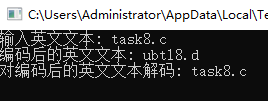


 浙公网安备 33010602011771号
浙公网安备 33010602011771号